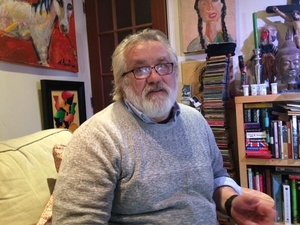By now most of you have heard of the language prejudice suffered by Zbigniew Malysa when he went to the CHUM for some medical tests and was refused service because he asks to have things explained in English. His daughter Suzanne has done a remarkable job of bringing this unconscionable behavior to the public's attention. We offered her whatever support and intervention she and her father need, and will continue to help through the pricess of examination of the behavior of the doctor by the CHUM and the Human Rights Commission to whom she has made a formal complaint.
 But for Quebec society as a whole, this issue has already brought forth a broader cause for concern. And this came from the words of the CHUM administration itself. In its communiqué committing to investigate the behavior of the doctor, the hospital ended with the following: "The public should understand that we are not obligated to offer all services in English." And that is simply not true. More than being not true, it is not even decent. Compassion should be the only language of healthcare.
But for Quebec society as a whole, this issue has already brought forth a broader cause for concern. And this came from the words of the CHUM administration itself. In its communiqué committing to investigate the behavior of the doctor, the hospital ended with the following: "The public should understand that we are not obligated to offer all services in English." And that is simply not true. More than being not true, it is not even decent. Compassion should be the only language of healthcare.
While it is a fact that certain institutions are designated as French or English, and some are bilingual, the rule for healthcare has been that all efforts be made to deliver service in the language understood to a reasonable degree by the patient. Indeed, Health Minister Barrette was quick to denounce any segregation by language or refusal to give service because of language as "totally unacceptable."
And to those who still argue that anglophones and allophones are the "best treated minorities" we would remind them that they sound like nothing more than retrofitted southern segregationists. There can never be a category of "best-treated" nor any distinction between minorities and majorities in free and democratic societies. All people are crated equal before the law and the state as regards opportunity and obligation. Once a society accepts two tiers of citizens - majority and minority - then it can be many things but it cannot be a just and democratic society. And no amount of injustice perpetrated in the past can justify curfent prejudice as a remedy.
The Malysa affair is not the first, nor will it be the last, such occurrence in health care. For the terrible virus of nullification will take years to contain. But we would like to remind you, our readers, of perhaps the most egregious example of healthcare and language. How far the politics of prejudice can go.
Several years ago the Health Minister Dr. Réjean Hébert took the unilateral decision to pull Lachine General Hospital out of its arrangement with the MUHC. Hébert justified his decision by saying it was necessary to protect Lachine's "francophone vocation." It is true that LG iwas listed as a francophone institution. But its decision to join the MUHC was based not only on its need for more money and doctors, but also on the fact that the physical proximity of the MUHC was simply closer than the francophone CHUM.
Since Lachine joined in 2008, there had been no reduction in the use of French. No patients made language complaints. In fact, the communities that Lachine General served only benefitted from more personnel, funding and specialists. Hébert's decision was purely political, creating an issue where none existed. In fact, part of his justification for the decision - apart from language - was that the hospital would be better off under the supervision of the local health agency.
Yet the utter incompetence of the local agency was one of the reasons Lachine decided to join the MUHC. The last year the local agency was in control it wanted to shut down the ER ward to save money! Hébert did know that? Since joining the MUHC, not only has LGH kept its ER open with more doctors, it is doing so well that the MUHC chose Lachine General as the central hub of its hemodialysis section. Quite a testament to the hospital's staff and strength.
Hébert's decision was roundly condemned not only by the hospital's medical staff led by Dr.Paul Saba (founder of Physicians for Social Justice), but by the then Mayors of the communities it serves including Claude Dauphin of Lachine and Edgar Rouleau of Dorval. Dr. Hébert had violated a cardinal tenet of the physician's oath. "Do no harm!"
One francophone nurse said in a TV interview, "What's the issue? We're here to make people well. We have enough people to speak either language." She understood "do no harm" better than the Minister. When it comes to what's best for healing, we need to listen to the healers not the politicians.

























Comments
Please login to post comments.